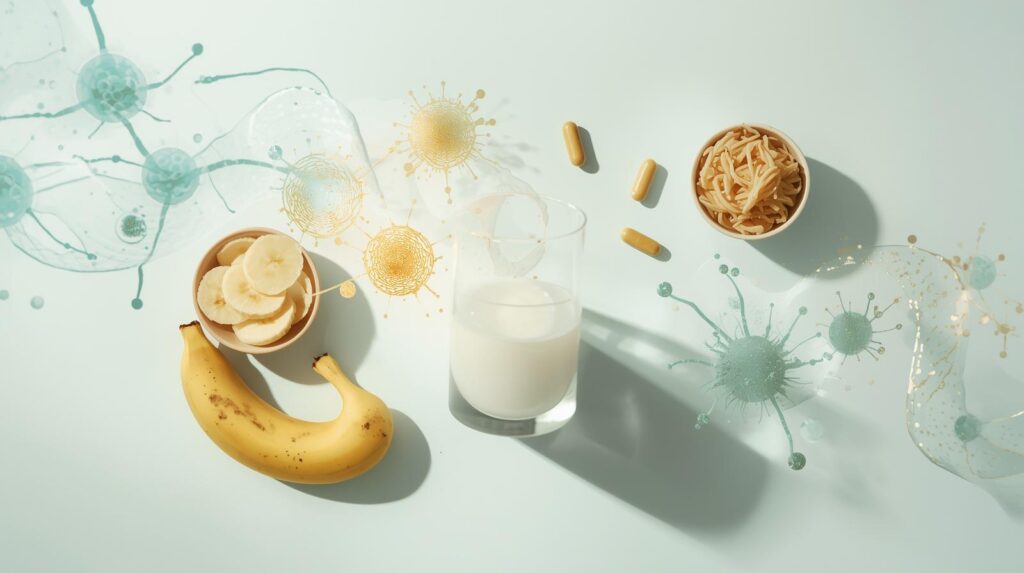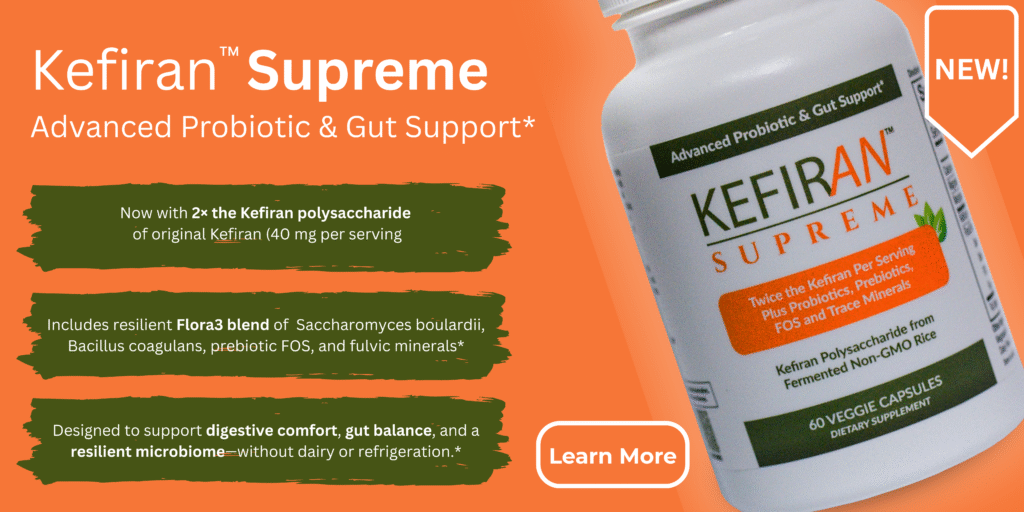Digestive Health
Resilient Microbes: The New Science of a Balanced Gut
Introduction: Why Resilient Microbes Matter
Resilient microbes are the tiny allies that help keep your gut ecosystem balanced. Every day, trillions of organisms in your digestive tract work together to support comfort, nutrient absorption, and immune function.* Yet stress, travel, and certain medications — including antibiotics — can temporarily disrupt this harmony.
Understanding which microbes are naturally resilient — and how they interact with the foods you eat — can make all the difference. Modern research highlights a few standouts: the probiotic yeast Saccharomyces boulardii, the spore-forming bacterium Bacillus coagulans, prebiotic fibers such as fructooligosaccharides (FOS), and kefir-derived compounds like kefiran. Together, these resilient microbes help nurture a comfortable, balanced gut environment.*

🦠 Balance begins with resilience — and resilience begins in your gut.
🧫 The Yeast That Stands Apart: Saccharomyces boulardii
Unlike most probiotics, S. boulardii is a yeast, not a bacterium. It has been studied for decades for its ability to help maintain digestive balance, promote healthy regularity, and support overall intestinal comfort.* Many people use S. boulardii as part of their daily wellness routine to help reduce occasional gas, bloating, or digestive upset and to encourage a stable environment for beneficial bacteria to flourish.*
This difference also gives S. boulardii remarkable resilience: its sturdy cell wall helps it survive stomach acid and resist the digestive side effects often caused by antibiotics. Because antibiotics are designed to target bacteria, they typically leave beneficial yeasts like S. boulardii untouched — allowing it to continue supporting gut comfort even when the microbial environment is temporarily disrupted.*
Unlike common Lactobacillus strains, which are beneficial bacteria that can be sensitive to heat or antibiotic use, S. boulardii’s yeast structure makes it naturally more stable and less affected by those conditions. While both types of probiotics can help support digestive balance, S. boulardii complements bacterial strains by adding diversity and durability to the gut’s microbial mix.*
🦠 The Spore-Former: Bacillus coagulans and the Art of Survival
Among bacterial probiotics, B. coagulans stands out as a spore-former — meaning it encloses itself in a protective shell that allows it to endure heat, moisture, and stomach acid. Once it reaches the intestines, the spore “wakes up,” becoming an active, beneficial organism that supports normal digestive activity and nutrient absorption.*
Because of this durability, B. coagulans is well suited for people with active lifestyles or variable diets. Research suggests it may help ease occasional gas, bloating, and minor abdominal discomfort by promoting a favorable balance of gut flora and supporting gentle regularity.* Think of it as a “traveler’s microbe” — reliable, adaptable, and designed to perform under pressure.
🌾 Feeding the Good Guys: The Role of FOS Prebiotics
Prebiotics such as fructooligosaccharides (FOS) act as the nourishment that good bacteria need to thrive. Found naturally in chicory root, onions, and bananas, FOS fibers pass through the upper digestive tract undigested and reach the colon, where beneficial microbes ferment them into short-chain fatty acids.
These compounds help foster a comfortable digestive environment and can support relief from occasional bloating or irregularity by encouraging smoother microbial activity.* In this way, prebiotics and probiotics form a team: probiotics add friendly organisms, while prebiotics keep them well-fed.
🥛 Kefir’s Hidden Strength: The Power of Kefiran
Kefir, a fermented milk drink with centuries of tradition, contains a unique polysaccharide called kefiran. Produced naturally during fermentation, kefiran contributes to kefir’s creamy texture while helping beneficial bacteria adhere to the gut lining and form balanced colonies.*
Beyond its texture, kefiran plays a subtle but important role in digestive wellness. This natural compound supports a balanced environment where beneficial bacteria can thrive, helping maintain comfort and regularity.* Studies suggest kefiran may also promote the production of short-chain fatty acids — natural compounds that nourish intestinal cells and help keep the gut lining strong.*
Because kefiran is produced during fermentation, it also carries properties that may help soothe occasional digestive upset and promote a feeling of lightness after meals, especially when paired with probiotic organisms like Lactobacillus kefiri and other friendly strains.* Its gentle, food-based origin makes it a bridge between traditional fermented foods and modern probiotic science — a perfect example of how nature’s fermentation process gives rise to truly resilient microbes and their supporting nutrients.
This connection between fermentation and microbial harmony underscores why kefir has earned its reputation as one of nature’s most balanced functional foods — a symbol of synergy among microbes, nutrients, and the gut environment.*
🦠 “Resilient microbes don’t just survive — they help your gut ecosystem adapt, rebalance, and thrive through life’s daily changes.”
🌍 The Ecosystem Approach: Diversity and Resilience
The human gut thrives on diversity. Resilient microbes like S. boulardii and B. coagulans bring stability; prebiotics like FOS feed the good bacteria; and fermented compounds such as kefiran help create a welcoming environment for all. Each plays a unique role — protection, nourishment, stabilization, and renewal.
This cooperative approach represents the next step in digestive wellness: moving beyond “one strain fits all” toward an ecosystem mindset. By eating a variety of plant fibers, fermented foods, and balanced probiotic sources, you can help your body maintain ongoing comfort, regularity, and digestive resilience.*
🧠 Key Takeaway
Resilient microbes remind us that gut health is about cooperation, not competition. Yeast, spores, prebiotics, and fermented nutrients work together like an orchestra — each instrument playing its part to keep your digestive system in harmony.*
Bonus Box: Everyday Ways to Support a Resilient Gut
1️⃣ Include fermented foods like kefir, yogurt, kimchi, and sauerkraut to naturally boost microbial diversity.
2️⃣ Choose fiber-rich foods — fruits, vegetables, and whole grains provide the prebiotics that feed friendly bacteria.
3️⃣ Stay consistent. A daily routine of balanced eating, hydration, and sleep helps beneficial microbes thrive.
4️⃣ Consider well-studied probiotic strains that complement your diet — particularly Saccharomyces boulardii and Bacillus coagulans, known for their stability and everyday digestive support.*
5️⃣ Remember balance, not overload. The gut responds best to variety and moderation.
🔗 References
Like? Share with Your Friends!

